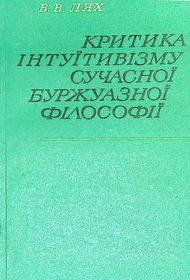The criticism of intuitionism in contemporary bourgeois philosophy: Monograph. Kyiv, Naukova Dumka, 1975, 111 p.
Synopsis
The monograph critically analyses the problems of the intuitionist methodology that is, as the author claims, a basis of many contemporary philosophical positions. The author aims to identify the sources of intuitionism and the respective methodology. The plausible reasons and grounds for the development of intuitionism are suggested: social pre-conditions and the development of idealistic philosophy. The author examines the concept of "intuition" and its interpretation by various philosophical currents. The book also provides criticism of existentialism as a philosophical trend that employs intuitionist methodology.
Contents
Introduction
- The problem of the genesis of knowledge and intellectual intuition in the philosophy of Modernity
- Concepts of intuition in philosophy from the 17th to the early 18th century
- The problem of intuition in Classical German philosophy.
- Intuitionism in bourgeois philosophy from the late 19th to the early 20th century
- The spread of irrationalism in bourgeois philosophy.
- "Philosophy of life". W. Dilthey.
- The Anti-intellectualism of A. Bergson's philosophical teaching
- "Seeing essence" in the phenomenology of E. Husserl
III. Critical analysis of the intuitionist methodology of French existentialism (J.-P. Sartre).
- Specificity of "being" and "consciousness" in French existentialism
- Critique of Sartre's "ontology" of human activity
- Irrationalism and indeterminism in Sartre's concept
- Methodological incapability of Sartre's "non-conceptual gnoseology"
Conclusion
Abstract
Downloads




